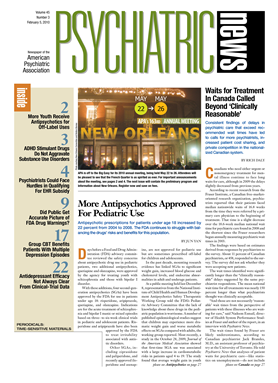Medicare no longer recognizes evaluation and management (E/M) consultation codes for Medicare Part B fee-for-service payment for services rendered after January 1, according to APA's Office of Healthcare Systems and Financing (OHSF).
What psychiatrists formerly billed as an office consultation should now be billed as an office or other outpatient visit for the evaluation and management of a new patient (99201-99205). An inpatient consultation should now be coded using the initial hospital care codes (99221-99223, but see cautions noted below). A consultation in a nursing facility should now be coded using the initial nursing facility care codes (99304-99306). And, finally, any consultations done as a home service should be coded as a home visit for the evaluation and management of a new patient (99341-99345).
Psychiatrists may still use 90801 (psychiatric diagnostic interview examination) for an initial patient visit.
Although consulting psychiatrists are still expected to document appropriately and communicate their findings to the doctor who referred the patient, they are no longer obligated to provide a written report to the referring clinician, which the consultation codes had required.
The Centers for Medicare and Medicaid Services (CMS) contends that the elimination of the consult codes should not decrease psychiatrists' Medicare payments since the work relative value units have been increased for initial hospital and nursing facility visits.
CMS has received complaints that there is no real match to the consultation codes in the inpatient initial visit codes (99221-99223). While there are inpatient consultation codes that provide for problem-focused histories and examinations (99251 and 99252), as would be demanded by many referrals dealing with specific issues, the lowest-level initial inpatient E/M code calls for a “detailed or comprehensive” history.
Some Medicare contractors (MACs) are advising clinicians to use a subsequent hospital visit code (99231 or 99233) when the history and examination are problem focused, while others are directing them to use code 99499 (unlisted E/M service). Currently OHSF is aware that TrailBlazer (the MAC for Colorado, New Mexico, Oklahoma, and Texas) and Noridian (the MAC for Arizona, Montana, North Dakota, South Dakota, Utah, and Wyoming) are telling physicians to use the subsequent visit codes. WPS (the MAC for Iowa, Kansas, Missouri, and Nebraska), First Coast (the MAC for Florida, Puerto Rico, and the Virgin Islands), Palmetto (the MAC for California, Hawaii, and Nevada), and the carrier for Ohio are instructing clinicians to bill 99499, while Cigna, the carrier for Idaho and North Carolina, is directing its clinicians not to use 99499 but to use the “appropriate” E/M code.
APA and other specialty societies are working with CMS to resolve these coding issues consistently. By the time APA members see this article, they should be able to find an updated guidance on their respective Medicare contractor's Web site. As soon as the information is available, OHSF will also post it on APA's Web site at <
www.psych.org/MainMenu/PsychiatricPractice/MedicareMedicaid.aspx>.
OHSF is monitoring how private insurers are responding to this new Medicare policy. Members are encouraged to check for updated information at the URL above. While some companies are still reimbursing clinicians who are using the consult codes, APA expects that all companies will eventually follow Medicare's new policy.
More information is available by calling APA's Managed Care HelpLine at (800) 343-4671 or Ellen Jaffe at (703) 907-8591. 
